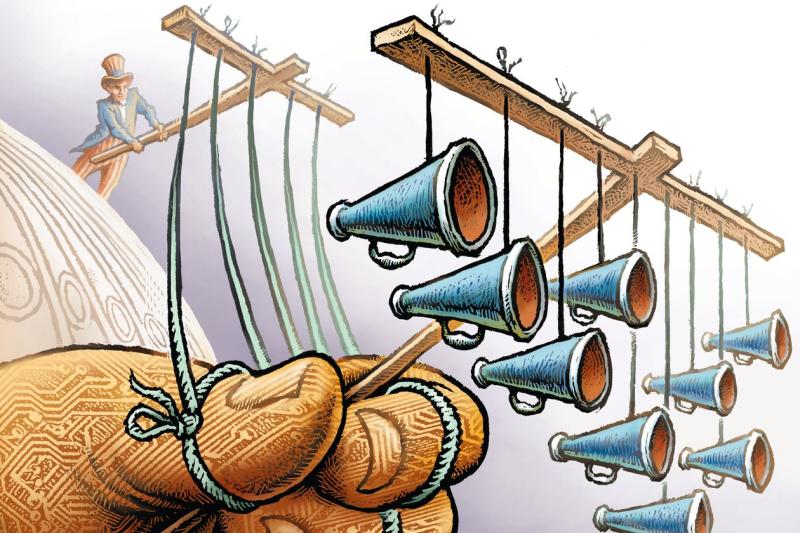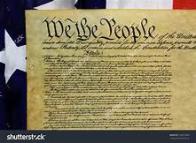Trump Can Win His Case Against Tech Giants
By: Vivek Ramaswamy


It’s time to take away the protections of big tech social media and end their illegitimate censorship of and view point discrimination against ideology, people, and viewpoints they don’t like. God bless President Trump in his effort to reign in the criminal syndicates and monopolies that are big tech and their evil CEO’s. May Facebook, Twitter, Google, all be bright down by the courts and stripped of their censorship and gatekeeper abilities. It should become a criminal felony offense to use the judgement of a third party entity to content control or viewpoint discriminate on the internet.

Trump Can Win His Case Against Tech Giants
The companies censor on the government’s behalf. There’s ample precedent for calling it state action.

The media has panned Donald Trump ’s First Amendment lawsuits against Facebook, Twitter and YouTube: “sure to fail,” “as stupid as you’d think,” “ridiculous.” Mr. Trump’s complaint omits important precedents, facts and claims for relief, but there’s a strong case to be made that social-media censorship violates the Constitution. If his lawyers do better in court than in their initial filing, Mr. Trump can win.
It’s true that the First Amendment ordinarily applies to the government rather than private companies. But the central claim in Mr. Trump’s class-action lawsuit—that the defendants should be treated as state actors and are bound by the First Amendment when they engage in selective political censorship—has precedent to back it up. Their censorship constitutes state action because the government granted them immunity from legal liability, threatened to punish them if they allow disfavored speech, and colluded with them in choosing targets for censorship.
The Supreme Court held in Norwood v. Harrison (1973) that the government “may not induce, encourage, or promote private persons to accomplish what it is constitutionally forbidden to accomplish.” As Jed Rubenfeld and I argued in these pages in January, that’s what Congress did by passing Section 230(c)(2) of the 1996 Communications Decency Act, which permits tech companies to censor constitutionally protected speech and immunizes them from state liability if they do so.
The high court has repeatedly held that federal immunity pre-empting state law can transform a private party’s conduct into state action subject to constitutional scrutiny. In Railway Employees’ Department v. Hanson (1956), the justices found state action in union-employer agreements because Congress had passed a statute immunizing such agreements from liability under state law. In Skinner v. Railway Labor Executives Association (1989), the court again found state action in a private company’s conduct because federal laws immunized companies from liability if they tested employees for drugs.
Prominent congressional Democrats have also issued severe, explicit and repeated threats to retaliate against social-media giants if they fail to remove “hate speech” and “misinformation” that the government can’t directly censor under the Constitution. These threats have worked.
In an October 2020 hearing, as Mr. Trump’s lawsuits note, Sen. Richard Blumenthal of Connecticut told CEOs Jack Dorsey of Twitter and Mark Zuckerberg of Facebook: “The president has used this microphone to spread vicious falsehoods and apparent attempt to overturn the will of the voters.” In the same hearing, he threatened “a breakup of the tech giants” and “Section 230 reform,” including “possible repeal.” Mr. Zuckerberg has called such regulations an “existential threat” to Facebook. In January both sites banned Mr. Trump.
The Supreme Court held in Bantam Books v. Sullivan (1963) that the First Amendment was violated when a private bookstore stopped selling works after officials deemed them “objectionable” and threatened prosecution. In Carlin Communications v. Mountain States Telephone & Telegraph Co. (1987), the Ninth Circuit Court of Appeals found that a telephone company was acting as a state agent when it acceded to government threats to stop carrying offensive content on paid dial-in lines.
Even if Messrs. Zuckerberg and Dorsey didn’t fear these government threats, the Second Circuit held in Hammerhead Enterprises v. Brezenoff (1983) that if government officials’ comments “can be reasonably interpreted as intimating that some form of punishment or adverse regulatory action will follow the failure to accede to the official’s request,” that’s enough to constitute state action. The Ninth Circuit has held that it doesn’t matter if the threats were the “real motivating force” behind the private party’s conduct.
A growing body of evidence suggests that social media companies have voluntarily worked with Democratic officials to censor content the latter disfavor. In Brentwood Academy v. Tennessee Secondary School Athletic Association (2001), the high court held that state action exists if the private party’s conduct results from “significant encouragement, either overt or covert,” or if the private party is a “willful participant in joint activity with the State or its agents.”
According to allegations in other pending lawsuits, Twitter formed “trusted partner” relationships with state officials to remove content identified by the officials as election misinformation—when in reality the content was simply critical of state policies.
In September 2020 Mr. Zuckerberg acknowledged that Facebook “works with” the Centers for Disease Control and Prevention to remove Covid-related content. The company’s official policy states that it is “advised” by public-health authorities about what Covid content should be blocked. For months, while officials including Anthony Fauci proclaimed that the Wuhan lab-leak theory was “debunked” and a “conspiracy theory,” Facebook blocked any mention of that theory as “misinformation.”
But after Dr. Fauci and the administration retreated from this position, Facebook almost immediately lifted its ban. Recently published email exchanges between Mr. Zuckerberg and Dr. Fauci reveal no evidence of direct instruction from the government on this point but make a case for Facebook’s willful participation in a joint activity with the government.
Mr. Trump’s lawsuits don’t go as far as they could have in establishing a pattern of willful participation, but their discovery phase will almost surely reveal additional examples. Social-media companies are privately owned, but when they collude with officials to block disfavored content, they are serving as the government’s censorship bureau and must answer to the First Amendment.
Mr. Trump has another path to legal victory even if he loses on the state-action claim. State legislatures, most recently in Florida, have begun to impose nondiscrimination and common-carrier requirements on Big Tech platforms. Opponents say these laws violate the companies’ First Amendment rights. But if so, how could similar nondiscrimination laws have been imposed for decades on telephone companies? Opponents also say these laws are pre-empted by Section 230. But as Justice Clarence Thomas observed in his concurrence in Biden v. Knight First Amendment Institute, Section 230 is arguably unconstitutional if interpreted to pre-empt state laws against viewpoint discrimination. Mr. Trump failed to assert this claim under Florida law, though he could amend his complaint before trial to do so.
Mr. Trump’s critics are mistaken to think the claims he raises are completely novel. But the case is unprecedented in another way—the staggering scale of Big Tech’s power to restrict speech. No company in U.S. history has so comprehensively silenced elected officials or prevented them from communicating with citizens. Worse, they did so at the behest of, and in careful coordination with, government leaders in the ascendant opposition party as it gained power.
In 1924 Commerce Secretary Herbert Hoover warned against the concentration of corporate power in the radio industry: “We cannot allow any single person or group to place themselves in a position where they can censor the material which shall be broadcasted to the public.” Almost a century later, the danger he foretold has been realized. Mr. Trump’s case provides an opportunity to address it.
Mr. Ramaswamy is author of “Woke Inc.: Inside Corporate America’s Social Justice Scam.”
Tags
Who is online
102 visitors


Freedom of the press mean Trump is WRONGO!
They lied and used misquotes in the initial filing. If it isn't tossed out I would be surprised.
The Wall St. Journal got it exactly right on this issue.
Did I hear something? I think a gnat is buzzing around...
There were several people here demanding that I show them how Trump can win his lawsuit. I have delivered on that.
Supreme Court Justice Thomas in a ruling on another issue stated that the Court was interested in theses issues regarding big tech social media. They may well now have the chance to do so.
" several people"?
You haven't convinced me!
Au contraire, mon petite chou!
If that's the best you (or Trump) have, then things will probably not go well for either of you.
Freedom of the press and free speech means that Trump and conservatives can participate in it and through it.
What exactly do those terms mean to you?
To me?
And more importantly, what is the actual law?
I'm pretty sure Trump will lose, he has a weak case.
I'm pretty sure Trump will lose, he has a weak case.
And furthermore-- I'm pretty sure he knows it!
So then why bring the case at all???
Simple: his followers, many of whom worship him as some sort of a god, will rally to the cause-- send him tons of contributions (money) to defend him, and also to "help defend" what they actually believe is free speech, mother, Apple pie, and "The American Way"!
In other words, he knows he had zero chance of winning-- he's doing it as a way to raise money (for himself) from his ass kissing, delusional followers!
(P.S: And while he won't win the case, he'll take in lots of money for himself personally)
Trump will likely lose his lawsuit, if it doesn't get dismissed altogether. Here's why:
First, Internet platforms like Facebook and Twitter are allowed to moderate their own platforms. So they can determine who to remove or not. Under Section 230 of the 1996 Communications Decency Act, which states: “no provider or user of an interactive computer service shall be treated as the publisher or speaker of any information provided by another information content provider.” Platforms can remove posts or users they feel violate their terms of service or rules, as long as it's done in good faith. Trump was allowed to remain active on social media (one would think a President would be too busy with real issues than to deal with social media) during his presidency and wasn't actually banned until he incited the Jan. 6 insurrection. So there's no history of Trump being "censored" regularly on these platforms (i.e. he's not being targeted). And they can easily say they felt Trump was using their platforms to incite violence or discord, defamation, threats, or other questionable actions. They probably have Trump's entire comment history on file.
Second, those "big tech" companies are private companies and not beholden to constitutional limits imposed on the government in such matters. But they do have first amendment rights to control the content they publish, including individual member's posts.
Third, assuming Trump's lawsuit actually manages to progress far enough, he would have to testify regarding the actions which led to his banning in the first place, especially with regards to Jan.6. Then there's all the instances of purposeful disinformation, defamation, ect.. I predict Trump would end up making a fool of himself if he were required to testify.
Fourth, attempts to sue the aforementioned companies have failed in the courts. Here are some examples:
There are other cases too. But I think you get the point. Recent Legal rulings clearly show Trump is on the losing side of his legal war. It's likely that the whole civil suit is nothing more than another publicity stunt to Trump and another attempt to incite rabid followers.
Your cut & paste doesn't actually refute anything I said. Trump's whole lawsuit seems to hinge on overturning Section 230. Unfortunately for him, that's not what the trial is about.
I have come to the conclusion that they are actually championing government control over the entities.
Comical considering the small government crowd...
That is a fair assumption.
Trump has several avenues open for success in his class action lawsuit. We will be rooting for his success every step of the way against the vile evil that is big tech social media.
Such as?
Twitter suspensions - Wikipedia
Hundreds of thousands of bots, terrorists, Qanon and many different kinds of trolls have been banned.
decent year by years lists of prominent banned members
Good on Twitter. Why should such types be allowed a platform?
Maybe because they have the same expectation to present their ideas and opinions as you have. Good on Trump for leading the class action.
So you think terrorists and such should be allowed a platform? Or that BS "ideas" should be entertained?
They let secular progressives on there don’t they? They qualify for the terms you use so recklessly.
Nice attempt at an ad hom. Not to mention a deflection from my question. Can't say I'm surprised. Those are your standard tactics, especially when questioned.
I stand by every word I wrote. My comment was no more an ad hom than yours that I replied to was.
Those who get banned by Twitter truly have earned a badge of honor. Twitter is an evil outfit.
Well of course you do
Do you even know what an ad hom is?
Doesn't that say something about Trump who has frequently used Twitter and is complaining about being banned from it and wants to get back on it?
You actually think he wants back on any of the big tech social media? I disagree.
No, I think he's just throwing a tantrum because his ego is bruised. I'd bet Trump wants back on those platforms just as a show of victory (or spite), if he actually won.
Your badge of honor is worthless, as is your opinion of Twitter.